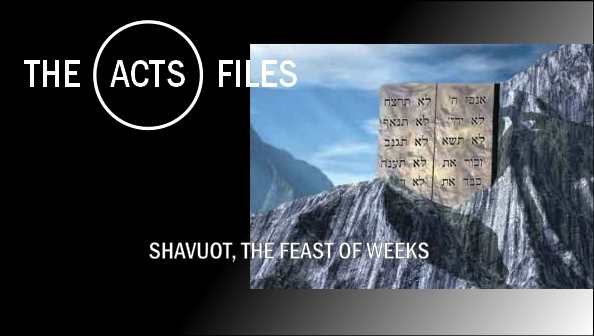By Tyson Thorne

Today is the Jewish holiday Shavuot, the Feast of Weeks, also known as Pentecost. Unlike most holidays, this one floats on the calendar and occurs 50 days after the Feast of First Fruits. So while it falls on June 4th this year, it was on June 2nd the year I was born -- my birthday – so I have an affinity for this Jewish celebration. While the Feast of First Fruits marked the beginning of the spring harvest, Shavuot marks the beginning of summer harvest.
For those interested, Leviticus 23.15-.21 and Numbers 28.26-.31 describe what offerings were to be made, and Deuteronomy 16.9-.12 outlined the requirements for worshipers. This was one of three holidays when Jewish men were to present themselves at the Temple. Aside from the celebration itself, which included a freewill offering, much rejoicing and remembering God’s rescuing the nation from Egyptian bondage, no work was to be performed on this day.
History has not been kind to Israel, however, having been subservient to Egypt, Babylon, Persia and Rome through the ages. The Romans were arguably the harshest rulers and the Hebrew people grew to despise their authority. The temple was leveled by the Romans in 70 AD and over time the people of God were thrown out of their capital city and not permitted to re-enter under penalty of death (circa 135 AD). Without the temple and without permission to enter the holy city, the people despaired. Many of their holy feasts, including Shavuot, could be celebrated no longer.
The Sanhedrin convened in 140 AD to respond to the grave situation. Meeting in the city of Usha (near modern day Haifa) they made a few changes to the Shavuot holiday. Instead of being associated with the summer harvest, they related it to the day God gave the law to Moses on Mount Sinai (which did historically occur in the third Hebrew month around the same time, Exodus 19.1). From that time forward, Shavuot became associated with the giving of the law and the birth of Judaism.
Today it is customary to decorate synagogues in green draperies, greenery and floral arrangements. Dairy foods like cheesecake and cheese blintzes are served up in abundance along with bread loaves and kreplach. It is customary to stay up all night studying and discussing the Law with occasional breaks for cheesecake and coffee. In Jerusalem the holiday ends with observant Jews walking to the site of the old temple and reciting at the Western Wall the Amidah prayer.
As with the other feasts we’ve already reviewed this year, Shavuot has both a historic and prophetic meaning. We’ve seen that its literal historic meaning was the celebration of the summer harvest, but its prophetic meaning was fulfilled circa 30 AD. We recently discussed its fulfillment in Acts chapter 2, the coming of the Holy Spirit and the beginning of the Church Age.
Related Articles: Passover Begins, Passover, Feast of Unleavened Bread, Feast of First Fruits, Pentecost Part 1, Pentecost Part 2.
|
|
|
